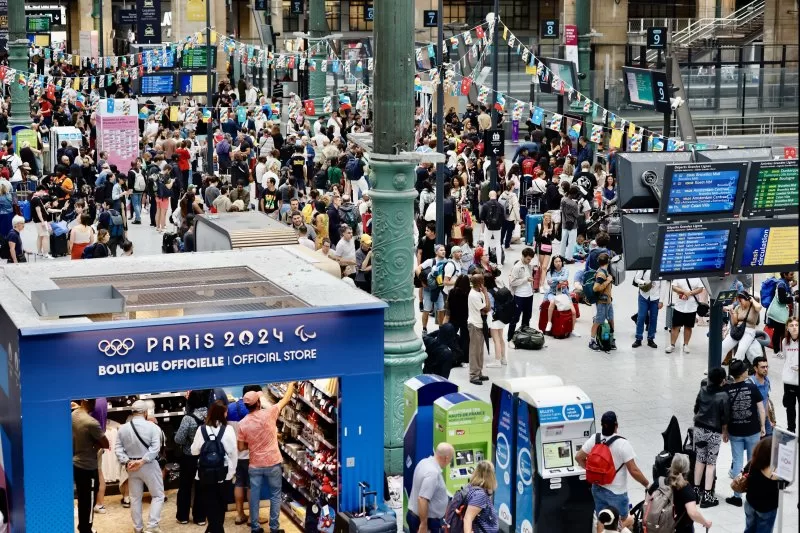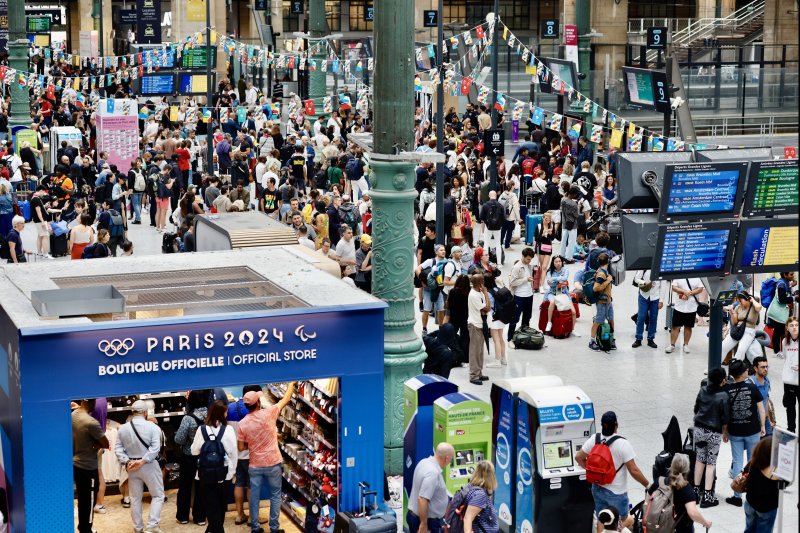Stranded passengers at Paris’ Gare du Nord station on Friday await travel updates after coordinated sabotage of large parts of France’s high-speed TGV rail network ahead of the opening of the 2024 summer olympics. At least 250,000 travelers were expected to be affected and more than 800,000 over the weekend. Photo by Ritchie B. Tongo/EPA-EFE
July 26 (UPI) — France’s high-speed rail network was severely disrupted Friday by a series of arson attacks hours before the Paris Olympics were due to open, the state operator of the country’s trains said.
The massive “sabotage” attacks affected at least 800,000 travelers after SNCF was forced to cancel or divert a large number of trains on three of its four main 200 mph TGV lines with Paris particularly badly hit, SNCF Group President Jean-Pierre Farandou told French television network BFMTV.
He warned of paralysis of the company’s LGV Atlantique, Nord and Est networks that could last all weekend as the breakdowns meant many trains would be either unable to depart the capital or delayed.
An attempt to sabotage the iconic Sud-Est line, Europe’s busiest high-speed route, linking Paris with the big cities in the south — Lyon and Marseille — was foiled by transit police.
Eurostar trains in France, to and from Paris, were being diverted with several delayed. Services between London and Paris were also affected with several trains canceled and all its normal 185 mph high-speed services diverted onto the slower “classic” line, increasing journey times from around 135 minutes to three-and-three-quarter hours, according to a statement on the company’s website.
Long lines began building up at Paris’s Gare du Nord and Gare du Montparnasse stations and at London St. Pancras where Eurostar began urging passengers to stay home.
In a post on X, passenger trains operator SNCF Voyaguers appealed to passengers not to go to stations and to postpone traveling, if possible, promising all those whose journeys were disrupted would be entitled to exchange their tickets or get a refund. It said affected travelers will be contacted by email or text.
Farandou said the timing and targeted nature of the attacks left him in no doubt of the intent.
The locations of the sites hit — Courtalain on the Atlantic line, Croisilles in the North and Pagny-sur-Moselle in the East — were at key junctions in the national network specifically “chosen so that with a fire, we would lose two lines at once,” he said.
SNCF said its engineering response teams were already on site to carry out diagnosis and begin repairs.
Prime Minister Gabriel Attal condemned what he said were “prepared and coordinated” attacks on SNCF installations, saying the intelligence services and law enforcement were working to find and punish those responsible.
“The consequences on the rail network are massive and serious”, he said in a post on X in which he expressed solidarity with his countrymen, especially those preparing to go on their vacations.
The disruption came as organizers prepared the finishing touches to an opening ceremony Friday night that will see more than 10,000 athletes transported past Paris’ iconic sights along the River Seine on a flotilla of boats watched by an audience of 300,000 people, VIPs and celebrities.
A massive security operation is in place involving 77,000 national police, gendarmes, troops and private security guards and a sealed security perimeter on both the left and right banks of the Seine.
IOC President Thomas Bach brushed off the sabotage attacks saying he did not think it would affect the opening ceremony and that he had “full confidence” in French authorities.
The attacks also coincided with the start of the “grand départ,” the day millions of Parisians traditionally leave the city for their summer vacation.

